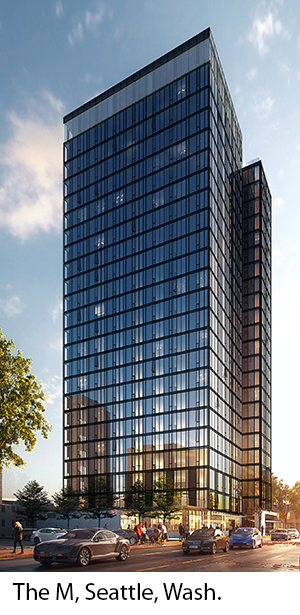
Dealmaker: Quantum Capital Partners Arranges $80M
Quantum Capital Partners, Beverly Hills, Calif., arranged $80 million for student housing and retail assets in Seattle and Los Angeles. 
In Seattle’s University District the firm arranged $64 million in construction financing for “The M,” a 24-story off-campus student housing development near the University of Washington at 4700 Brooklyn Avenue NE. Fields Holdings LLC, Los Angeles, is developing The M across the street from LIV Seattle, a fully occupied 56-unit/200 bed student housing community it developed in 2015.
“The developer selected a five-year non-recourse loan provided by CapitalSource,” said Quantum Managing Director Jonathan Hakakha.
The M–the first new high-rise in the two square mile University District in more than 30 years–should be ready for occupancy in the 2020/2021 school year. Its 230 units will range from studio to four-bedroom apartment homes above 4,350 square feet of street-level retail within walking distance to fraternity and sorority row and the neighborhood’s primary retail corridor.
Quantum also arranged $16 million in long-term first mortgage debt to recapitalize a new 27,000-square-foot retail center in downtown Los Angeles’ Arts District. Located at 833 E. Third Street, the retail center is the $5 million adaptive reuse of a 1930’s bowstring truss warehouse building by Third Art Holdings LLC.
Completed in 2017, the property is fully leased to tenants including fashion boutique H. Lorenzo, high-end retailer Shinola and ice creamery Salt and Straw.
Deutsche Bank originated the 10-year commercial mortgage-backed securities loan that took out the construction loan and returned equity to the sponsor, Hakakha said.
Hakahka said a variety of lenders including life insurance companies, non-bank and traditional lenders expressed interest in the asset. “Our sponsors ultimately believed the non-recourse, interest-only CMBS financing best suited their long-term goals,” he said.
Quantum Managing Director Mike Yim said there is still “ample liquidity” in the capital markets for quality assets, especially for urban retail projects that connect the asset to the lifestyles of the neighborhood’s residents.
